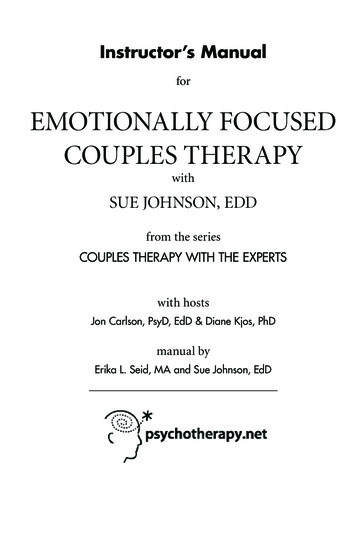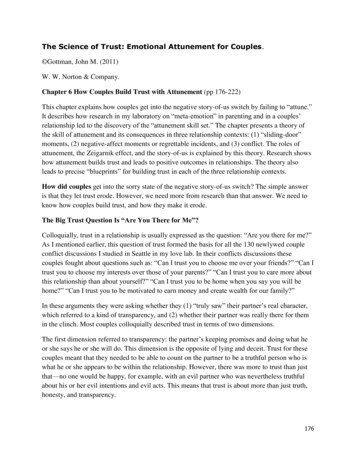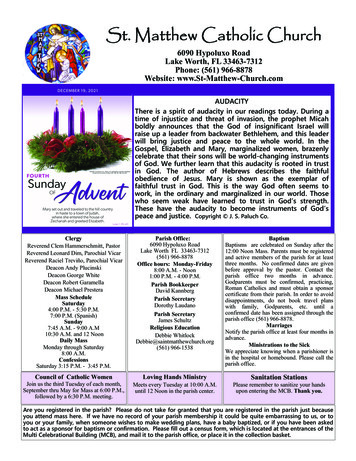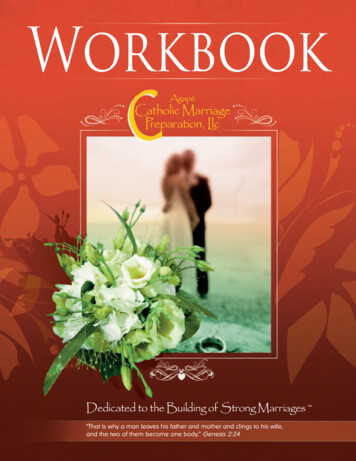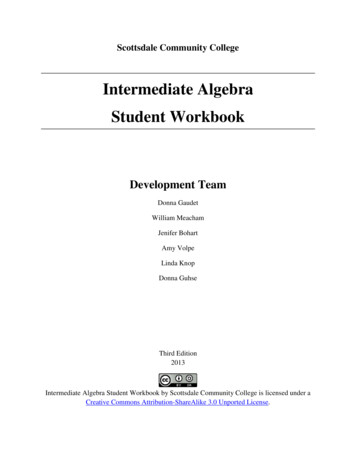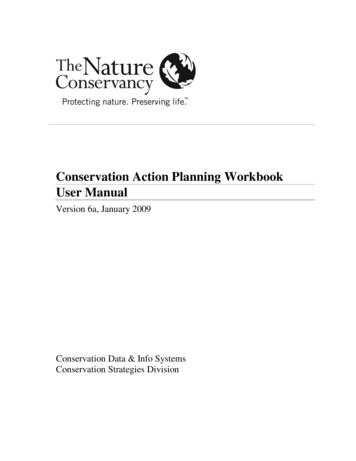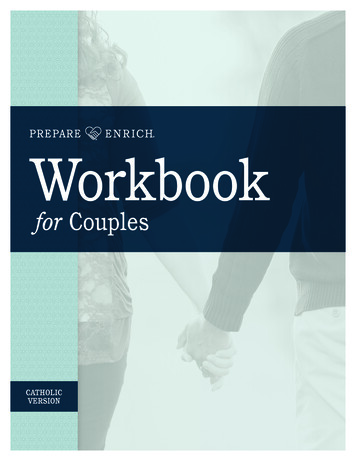
Transcription
Workbookfor CouplesCATHOLICVERSION
The Catholic version of PREPARE/ENRICHcouple’s relationship assessment, Catholic Couple Checkup,and the Workbook for Couples: Catholic Version have receivedCensors Liborum declarations of Nihil Obstat & Imprimaturfrom the Archdiocese of St. Paul & Minneapolis. 2012, 2016, 2017 PREPARE/ENRICH, LLCScripture quotations are taken from the Holy Bible, New Living Translation, copyright 1996, 2004, 2007, 2013, 2015by Tyndale House Foundation. Used by permission of Tyndale House Publishers, Inc., Carol Stream, Illinois 60188. All rights reserved.
WELCOMECONGRATULATIONS!You are joining over 4 million couples who have taken this important step in building a strong marriage and healthyrelationship by taking the PREPARE/ENRICH assessment. For over 35 years, research studies have demonstratedPREPARE/ENRICH can improve your relationship skills and happiness as a couple.The PREPARE/ENRICH Workbook for Couples is a complement to your assessment results. It contains skill-buildingexercises that will help you to understand and apply the insights from the assessment. The exercises consist of questions to both ponder individually and discuss as a couple plus activities to do together. Begin with the recommendedSix Core Exercises and continue with the remaining exercises in in any order. This version includes references to theCatechism of the Catholic Church as indicated by paragraph numbers as well as Bible verses for reflection, inspirationand encouragement.KEY" Six Core Exercises Couple Discussion Tips or Optional ActivityAdditional ResourcesPREPARE/ENRICH offers additional ways to help you prioritize, enrich, and strengthen your relationship: Join our Strong Couple’s Club at prepare-enrich.com/strong.couples.club.html Read our blog at blog.prepare-enrich.com Connect with us on social pareenrich-youtube.com/prepareenrich Take our “do it yourself” assessment, Couple Checkup, on your wedding anniversary at couplecheckup.comIf you find you have ongoing problems that don’t go away over time, it is important to seek professional counseling.Like any problem or illness, the sooner you go for help the better the chances are for recovery. If problems persist,contact your current Facilitator or go to prepare-enrich.com to find a Facilitator in your area. 2017www.prepare-enrich.com 2
WORKBOOK FOR COUPLES CONTENTS" Six Core ExercisesCatholic Views of Marriage . . . . . . . . . . . . . . . . . . . . . . . . . . . . . . . . . . . . . . . . . . . . . . . . . . . . . . . . . . . . . . . . . . . . . . . . . . . . . 4" Sharing Strength and Growth Areas . . . . . . . . . . . . . . . . . . . . . . . . . . . . . . . . . . . . . . . . . . . . . . . . . . . . . . . . . . . . . . . . . . . . . .6CommunicationAssertiveness and Active Listening . . . . . . . . . . . . . . . . . . . . . . . . . . . . . . . . . . . . . . . . . . . . . . . . . . . . . . . . . . . . . . . . . 7" Creating a Wish List Using Assertiveness and Active Listening . . . . . . . . . . . . . . . . . . . . . . . . . . . . . . . . . . . . . . . . 8Daily Dialogue and Daily Compliments . . . . . . . . . . . . . . . . . . . . . . . . . . . . . . . . . . . . . . . . . . . . . . . . . . . . . . . . . . . . . . 9Personal Stress Profile" Identifying Most Critical Issues . . . . . . . . . . . . . . . . . . . . . . . . . . . . . . . . . . . . . . . . . . . . . . . . . . . . . . . . . . . . . . . . . . . .11Balancing your Priorities. . . . . . . . . . . . . . . . . . . . . . . . . . . . . . . . . . . . . . . . . . . . . . . . . . . . . . . . . . . . . . . . . . . . . . . . . . 12Wedding Stress . . . . . . . . . . . . . . . . . . . . . . . . . . . . . . . . . . . . . . . . . . . . . . . . . . . . . . . . . . . . . . . . . . . . . . . . . . . . . . . . . 13Conflict Resolution" Ten Steps for Resolving Conflict . . . . . . . . . . . . . . . . . . . . . . . . . . . . . . . . . . . . . . . . . . . . . . . . . . . . . . . . . . . . . . . . . . . 15How to Take a Time-Out . . . . . . . . . . . . . . . . . . . . . . . . . . . . . . . . . . . . . . . . . . . . . . . . . . . . . . . . . . . . . . . . . . . . . . . . . 16Seeking and Granting Forgiveness . . . . . . . . . . . . . . . . . . . . . . . . . . . . . . . . . . . . . . . . . . . . . . . . . . . . . . . . . . . . . . . . . 17Financial ManagementThe Challenges of Money . . . . . . . . . . . . . . . . . . . . . . . . . . . . . . . . . . . . . . . . . . . . . . . . . . . . . . . . . . . . . . . . . . . . . . . . . 19The Meaning of Money . . . . . . . . . . . . . . . . . . . . . . . . . . . . . . . . . . . . . . . . . . . . . . . . . . . . . . . . . . . . . . . . . . . . . . . . . . . 20Priorities: Put Your Money Where Your Heart Is. . . . . . . . . . . . . . . . . . . . . . . . . . . . . . . . . . . . . . . . . . . . . . . . . . . . . . 21Importance of Financial Goals . . . . . . . . . . . . . . . . . . . . . . . . . . . . . . . . . . . . . . . . . . . . . . . . . . . . . . . . . . . . . . . . . . . . . 23Budget Worksheet . . . . . . . . . . . . . . . . . . . . . . . . . . . . . . . . . . . . . . . . . . . . . . . . . . . . . . . . . . . . . . . . . . . . . . . . . . . . . . 24Leisure ActivitiesThe Dating Exercise . . . . . . . . . . . . . . . . . . . . . . . . . . . . . . . . . . . . . . . . . . . . . . . . . . . . . . . . . . . . . . . . . . . . . . . . . . . . . 26Sex and AffectionThe Expression of Intimacy . . . . . . . . . . . . . . . . . . . . . . . . . . . . . . . . . . . . . . . . . . . . . . . . . . . . . . . . . . . . . . . . . . . . . . . 27Relationship RolesSharing Roles . . . . . . . . . . . . . . . . . . . . . . . . . . . . . . . . . . . . . . . . . . . . . . . . . . . . . . . . . . . . . . . . . . . . . . . . . . . . . . . . . . . 29Spiritual BeliefsYour Spiritual Journey . . . . . . . . . . . . . . . . . . . . . . . . . . . . . . . . . . . . . . . . . . . . . . . . . . . . . . . . . . . . . . . . . . . . . . . . . . . . 31Marriage ExpectationsManaging Your Expectations . . . . . . . . . . . . . . . . . . . . . . . . . . . . . . . . . . . . . . . . . . . . . . . . . . . . . . . . . . . . . . . . . . . . . . 33Children and ParentingCouple Discussion about Children . . . . . . . . . . . . . . . . . . . . . . . . . . . . . . . . . . . . . . . . . . . . . . . . . . . . . . . . . . . . . . . . . 35Planning a Weekly Family Conference . . . . . . . . . . . . . . . . . . . . . . . . . . . . . . . . . . . . . . . . . . . . . . . . . . . . . . . . . . . . . . 35Stepfamilies: Choosing Realistic Expectations . . . . . . . . . . . . . . . . . . . . . . . . . . . . . . . . . . . . . . . . . . . . . . . . . . . . . . 36" Couple and Family MapsMapping Your Relationship . . . . . . . . . . . . . . . . . . . . . . . . . . . . . . . . . . . . . . . . . . . . . . . . . . . . . . . . . . . . . . . . . . . . . . . 38Closeness Exercises . . . . . . . . . . . . . . . . . . . . . . . . . . . . . . . . . . . . . . . . . . . . . . . . . . . . . . . . . . . . . . . . . . . . . . . . . . . . .40Flexibility Exercises . . . . . . . . . . . . . . . . . . . . . . . . . . . . . . . . . . . . . . . . . . . . . . . . . . . . . . . . . . . . . . . . . . . . . . . . . . . . . 41" PersonalitySCOPE Out Your Personality . . . . . . . . . . . . . . . . . . . . . . . . . . . . . . . . . . . . . . . . . . . . . . . . . . . . . . . . . . . . . . . . . . . . . . 43GoalsAchieving Your Goals.Together . . . . . . . . . . . . . . . . . . . . . . . . . . . . . . . . . . . . . . . . . . . . . . . . . . . . . . . . . . . . . . . . . . . 45 2017www.prepare-enrich.com 3
CATHOLIC VIEW OF MARRIAGEFrom www.ForYourMarriage.org, an initiative of theUnited States Conference of Catholic BishopsMARRIAGE READINESSHaving a successful marriage means more than FINDING the right person. It means BEING the right person. Sometimes, the FINDING part is easier. . .BEING the right person can be tougher. Are you easy to live with, generous, flexible, and willing to put your beloved’sneeds before your own? Above all, are both of you mature? Maturity means knowing who you are your talents yourweaknesses your interests the things you hate to do the values that you will not compromise the preferences thatyou are willing to bend on and, what you want out of life and marriage.Out of this self-knowledge comes the possibility of giving oneself freely to your beloved.CATHOLIC BELIEFSCatholics believe that marriage comes as a gift from the hand of God. The Catholic vision of marriage is rooted inSacred Scripture and is expressed in the teachings and practices of the Church. It has these main elements: Marriage unites a couple in faithful and mutual love Marriage opens a couple to giving life Marriage is a way to respond to God’s call to holiness Marriage calls the couple to be a sign of Christ’s love in the worldBIBLICAL ROOTS OF MARRIAGEOld TestamentAccording to Sacred Scripture, God instituted marriage as the pinnacle of creation. On the sixth day, in the first creation story, the Book of Genesis tells us: “God created man in his image; in the divine image he created him; male andfemale he created them. God blessed them, saying: ‘Be fertile and multiply, fill the earth and subdue it’” (Genesis 1:27-28).In the second creation story, God says that “it is not good for man to be alone. I will make a suitable partner for him.”(Genesis 2:18). This suitable helpmate was formed from the very rib of man and thus woman was “flesh of his flesh”(Genesis 2:22-23).Woman, then, is man’s equal in dignity and the one closest to his heart. Because man and woman were created forone another, “a man leaves his father and mother and clings to his wife, and the two of them become one flesh” (Genesis 2: 24). Scripture teaches that marriage is not a mere human institution, but something God established from thefoundation of the world.Sin not only brought about a break with God, but it also ruptured the original communion between man and woman.Adam and Eve blamed each another for what had happened and were now embarrassed by their nakedness (Genesis3:7-13). The Old Testament shows how sin affected the goodness of marriage 2017 2012 USCCBwww.prepare-enrich.com 4
CATHOLIC VIEW OF MARRIAGEFrom www.ForYourMarriage.org, an initiative of theUnited States Conference of Catholic BishopsNew TestamentChristians are new creations in Christ, healed of sin and its effects. Marriage is also recreated and made new in Christ.Jesus tells us that in the Kingdom of God the permanent union of husband and wife that God originally intended canonce more be realized (see Matthew 19:6-11). By the grace of the Holy Spirit, husbands and wives can now truly loveand honor one another. St. Paul tells us that marriage bears witness to the indissoluble love of Christ for his Church.Thus, husbands should love their wives, “even as Christ loved the church and handed himself over for her to sanctifyher” (Eph. 5:25-26). Wives, too, are called to love their husbands as the Church loves Christ (see Eph. 5:22-23) Because marriage is placed within the saving mystery of Jesus Christ, Catholics recognize it as a sacrament. It is ameans through which husbands and wives grow in love for one another and for their children, become holy and obtaineternal life.For further reading: Catechism of the Catholic Church, #1602-1617MEANING AND PURPOSE OF MARRIAGEMarriage is the intimate union and equal partnership of a man and a woman. It comes to us from the hand of God,who created male and female in his image, so that they might become one body and might be fertile and multiply (SeeGenesis chapters 1 and 2). Though man and woman are equal as God’s children, they are created with important differences that allow them to give themselves and to receive the other as a gift.Marriage is both a natural institution and a sacred union because it is rooted in the divine plan of creation. In addition,the Catholic Church teaches that the valid marriage between two baptized Christians is also a sacrament – a savingreality and a symbol of Christ’s love for his church (See Ephesians 5:25-33). In every marriage the spouses make acontract with each other. In a sacramental marriage the couple also enters into a covenant in which their love is sealedand strengthened by God’s love.The free consent of the spouses makes a marriage. From this consent and from the sexual consummation of marriagea special bond arises between husband and wife. This bond is lifelong and exclusive. The marriage bond has beenestablished by God and so it cannot be dissolved Permanency, exclusivity, and faithfulness are essential to marriage because they foster and protect the two equalpurposes of marriage. These two purposes are growth in mutual love between the spouses (unitive) and the generation and education of children (procreative) The family arises from marriage. Parents, children, and family members form what is called a domestic church orchurch of the home. This is the primary unit of the Church – the place where the Church lives in the daily love, care,hospitality, sacrifice, forgiveness, prayer and faith of ordinary families.For further reading: Catechism of the Catholic Church, #1601-1666 2017 2012 USCCBwww.prepare-enrich.com 5
SHARING STRENGTH AND GROWTH AREASBut the Holy Spirit produces this kind of fruit in our lives: love, joy, peace, patience, kindness,goodness, faithfulness, gentleness, and self-control . . . — Galatians 5:22-23Check what areas you agree or disagree most with your partner.1. Select three Strength Areas (most agreement and positive aspects of your relationship)2. Select three Growth Areas (most disagreement and areas you want to improve)STRENGTH AREASGROWTH AREAS1. COMMUNICATIONWe share feelings and understand each other.2. CONFLICT RESOLUTIONWe are able to discuss and resolve differences.3. PARTNER STYLE AND HABITSWe appreciate each other’s personality and habits.4. FINANCIAL MANAGEMENTWe agree on budget and financial matters.5. LEISURE ACTIVITIESWe have a good balance of activities together and apart.6. SEXUALITY AND AFFECTIONWe are comfortable discussing sexual issues and affection.7. FAMILY AND FRIENDSWe feel good about our relationships with relatives and friends.8. RELATIONSHIP ROLESWe agree on how to share decision-making and responsibilities.9. CHILDREN AND PARENTINGWe agree on issues related to having and raising children.10. SPIRITUAL BELIEFSWe hold similar religious values and beliefs.COUPLE DISCUSSION Take turns sharing what each of you perceive as your relationship strengths.Verbally share one strength at a time, until you each have shared three. Use the same procedure to share and discuss growth areas. Discuss these three questions:- Did any of your partner’s responses surprise you?- In what areas did you mostly agree with your partner?- In what areas did you mostly disagree with your partner? 2017www.prepare-enrich.com 6
COMMUNICATIONUnderstand this, my dear brothers and sisters: You must all be quick to listen,slow to speak, and slow to get angry. — James 1:19ASSERTIVENESSAssertiveness is the ability to express your feelings and ask for what you want in the relationship.Assertiveness is a valuable communication skill. In successful couples, both individuals tend to be quite assertive.Rather than assuming their partner can read their minds, they share how they feel and ask clearly and directly forwhat they want.Assertive individuals take responsibility for their messages by using “I” statements. They avoid statements beginningwith “you.” In making constructive requests, they are positive and respectful in their communication. They use politephrases such as “please” and “thank you”.Examples of Assertive Statements“I’m feeling out of balance. While I love spending time with you, I also want to spend time with myfriends. I would like us to find some time to talk about this.”“I want to take a ski vacation next winter, but I know you like to go to the beach. I’m feeling confused about what choice we should make.”ACTIVE LISTENINGActive listening is the ability to let your partner know you understand them by restating their message.Good communication depends on you carefully listening to another person. Active listening involves listening attentively without interruption and then restating what was heard. Acknowledge content AND the feelings of the speaker.The active listening process lets the sender know whether or not the message they sent was clearly understood byhaving the listener restate what they heard.Examples of Active Listening“I heard you say you are feeling ‘out of balance’, and enjoy the time we spend together but that youalso need more time to be with your friends. You want to plan a time to talk about this.”“If I understand what you said, you are concerned because you want to go skiing next winter. Butyou think I would rather to go to the beach. Is that correct?”When each person knows what the other person feels and wants (assertiveness) and when each knows they havebeen heard and understood (active listening), intimacy is increased. These two communication skills can help yougrow closer as a couple. 2017www.prepare-enrich.com7
COMMUNICATIONMay the words of my mouth and the meditation of my heart be pleasing to you,O Lord, my rock and my redeemer. — Psalm 19:14CREATING A WISH LISTIn this exercise, you will each individually make a Wish List of things you would like more or less of in your relationship.Next, take turns sharing your Wish Lists with each other.Assertiveness is the ability to express your feelings and ask for what you want in your relationship.Active listening is the ability to let your partner know you understand them by restating their message.In sharing your Wish List with your partner, you will be demonstrating your Assertiveness skills. In giving feedback toyour partner about their Wish List, you will be demonstrating your Active Listening skills.Make a Wish List of three things you would like more or less of in your relationship.1.2.3.SHARING YOUR WISH LISTTake turns sharing your Wish List with each other, keeping in mind the following: Speaker’s Job:-Speak for yourself (“I” statements e.g. ”I wish.”).-Describe how you would feel if your wish came true. Listener’s Job:-Repeat/summarize what you have heard.-Describe the wish AND how your partner would feel if the wish came true.COUPLE DISCUSSIONAfter completing the Wish List Exercise, discuss the following questions: How good were each of you at being assertive? In what ways did you each effectively use active listening skills? 2017www.prepare-enrich.com 8
COMMUNICATIONSome people make cutting remarks, but the words of the wise bring healing.— Proverbs 12:18DAILY DIALOGUE AND DAILY COMPLIMENTSDaily Dialogue is an intentional effort to talk about your relationship, rather than discussing your activities that day.The focus of this dialogue should be on your feelings about each other and your lives together. Set aside five minutesper day to discuss the following: What did you most enjoy about your relationship today? What was dissatisfying about your relationship today? How can you be helpful to each other?Daily Compliments help you focus on the positive things you like about each other. Every day give your partner atleast one genuine compliment. These can be general (“you are fun to be with”) or specific (“I appreciate that you wereon time for the concert”).COMMUNICATION SKILLS TO INCREASE INTIMACY1. Give full attention to your partner when talking. Turn off the phone, shut off the television, makeeye contact.2. Focus on the good qualities in each other and praise each other often.3. Be assertive. Share your thoughts, feelings, and needs. A good way to be assertive without beingcritical is to use “I” rather than “You” statements. (e.g. “I worry when you don’t let me know you’ll belate” rather than “You are always late”).4. Avoid criticism.5. If you must criticize, balance it with at least one positive comment.(e.g.“I appreciate how youtake the trash out each week. In the future can you remember to also wheel the trash can back fromthe end of the driveway?” ) .6. Listen to understand, not to judge.7. Use active listening. Summarize your partner’s comments before sharing your own reactions orfeelings.8. Avoid blaming each other and work together for a solution.9. Use the Ten Steps approach. For problems that come up again and again, use the Ten Steps forResolving Couple Conflict.10. Seek counseling. If you are not able to resolve issues, seek counseling before they become moreserious. 2017www.prepare-enrich.com 9
WHAT THE CATHOLIC FAITH SAYS ABOUT COMMUNICATIONMarriage comes as a gift from the Hand of God.—www.foryourmarriage.orgCCC#2477Respect for the reputation of persons forbids every attitude and word likely to cause them unjust injury.278 He becomesguilty: of rash judgment who, even tacitly, assumes as true, without suffi cient foundation, the moral fault of a neighbor; of detraction who, without objectively valid reason, discloses another’s faults and failings to persons who did notknow them;279 of calumny who, by remarks contrary to the truth, harms the reputation of others and gives occasion for falsejudgments concerning them.CCC#2489Charity and respect for the truth should dictate the response to every request for information or communication. Thegood and safety of others, respect for privacy, and the common good are suffi cient reasons for being silent about whatought not be known or for making use of a discreet language. The duty to avoid scandal often commands strict discretion. No one is bound to reveal the truth to someone who does not have the right to know it.283“We need to develop certain attitudes that express love and encourage authentic dialogue. Take time, quality time.This means being ready to listen patiently and attentively to everything the other person wants to say. It requires theself-discipline of not speaking until the time is right. Instead of offering an opinion or advice, we need to be sure thatwe have heard everything the other person has to say. This means cultivating an interior silence that makes it possible to listen to the other person without mental or emotional distractions. Do not be rushed, put aside all of your ownneeds and worries, and make space. Often the other spouse does not need a solution to his or her problems, but simplyto be heard, to feel that someone has acknowledged their pain, their disappointment, their fear, their anger, their hopesand their dreams.” —Pope Francis, “The Joy of Love”PSALM 19:14May the words of my mouth and the meditation of my heart be pleasing to you, O LORD, my rock and my redeemer.PROVERBS 18:13Spouting off before listening to the facts is both shameful and foolish.Cf. CIC, Can.220Cf. Sir 21:28283Cf. 27:16, Prov 25:9-10278279 2017www.prepare-enrich.com 10
PERSONAL STRESS PROFILEThen Jesus said, “Come to me, all of you who are weary and carry heavy burdens,and I will give you rest. — Matthew 11:28IDENTIFYING MOST CRITICAL ISSUESDo you control stress in your life or does stress control you?Stressors are events that cause an emotional and/or physical reaction. Stress can be positive (wedding, job promotion) or negative (loss of job, car accident, major illness). But what is important is to be able to manage the manystressors in your life.One way to manage stress is to prioritize the issues that are most important to you. Another is to decide what issuescan be changed or resolved and which ones cannot. This exercise will help you focus on the high priority issues andthose that can be changed (Box 1).COUPLE EXERCISE1. Select up to four issues that are the most stressful for each of you.2. Review each issue and put it into one of the four cells below. (Box 1 contains the “Most Critical Issues.”)Able to ChangeBox 1Difficult to ChangeBox 2MOST CRITICALISSUESHighPriorityWhat changes can you each make?Box 3How do you plan to cope?Box 4LEAST CRITICALISSUESLowPriorityAre you spending too much time on low priority issues?Can you accept or forget about these issues?COUPLE DISCUSSION Select one issue from Box 1 that you will work on together as a couple. Work together as a team to achieve your goals.- Communicate about the issue.- Use good conflict resolution skills.- Be flexible with one another. 2017www.prepare-enrich.com 11
PERSONAL STRESS PROFILEMy health may fail, and my spirit may grow weak, but God remainsthe strength of my heart; He is mine forever. —Psalm 73:26BALANCING YOUR PRIORITIESFirst, indicate how much time you “Now” spend on each of these areas. Next, decide on the amount of time you wouldideally spend: “Your Goal.” Then decide how you can achieve your goal.WORKNOW(hours/week)GOALHow will you move towards your goal?Time on job/schoolBringing work deo gamesHobby/recreationReadingFriendsReligious activitiesVolunteeringSleep (hours per night)MARRIAGE (Couple)At home togetherActivities/datesDiscussions (minutes per day)HOMECleaningCookingGrocery shoppingErrandsLawn/gardenHome maintenanceFAMILY (if children at home)Number of meals togetherFamily activitiesTransporting childrenHelping with homeworkAt home togetherCOUPLE DISCUSSION What areas feel out of balance to each of you? What steps must you take in order for your goal to become reality? 2017www.prepare-enrich.com 12
PERSONAL STRESS PROFILEDon’t worry about anything; instead, pray about everything. Tell Godwhat you need, and thank him for all he has done. — Philippians 4:6WEDDING STRESSDifferences and disagreements are as inevitable in wedding planning as they are in marriage itself. This is a good timeto learn how to deal with them. Here are some strategies you might find helpful:1. Consider the big picture as it affects each decision. Some decisions will be made consequentially as otherwishes are discussed. For example, the guest list should be created early because it shapes decisions aboutfacilities and costs, among other things. If one of you wants a tropical beach wedding and the other a hometownwedding, you can discuss these options in the light of other issues such as the fact both of you want your frailgrandparents to come to your wedding. Seeing the larger picture can help you resolve differences.2. Ask yourselves who cares more about the issue. You can decide to gracefully adjust your preference if yourpartner has strong feelings about an issue. You may prefer a small, intimate wedding but your partner has cherished the family tradition of a large wedding. Try setting a number that gives more to the person who cares themost.3. Periodically assess your wedding-planning stress and feelings of competency. If your partner has not followed through on a task they were responsible for, or if you feel better equipped for a particular task, politely offerto help or take over (e.g., “I am interested in photography and have a light work schedule next week. Is it okay ifI research a photographer?”). The key is to agree together on a shift of responsibility, rather than saying, “Sinceyou won’t do it, I will!” The person who has been relieved of one responsibility should then offer to help with otherresponsibilities.4. Teach and learn from one another rather than assuming the other “gets it.” Sometimes one of you will not seea problem that is quite clear to the other. You can both educate each other about your families and their traditions.The groom from a Catholic family should explain to his Protestant bride what is involved in a traditional Catholicwedding, rather than having surprises keep coming up.5. Consider whether deeper issues are underlying your conflict. If you are doing your best to deal with your differences and yet remain polarized, look for deeper issues. For example, sometimes the issue is not about the size ofthe wedding but about a feeling of envy or competition because one of you has a bigger family or circle of friends.Sometimes the issue is not between the two of you, but between one of you and your family members.The standard tools of effective communication taught in PREPARE/ENRICH are particularly important when thereis tension between you. Examples are speaking for yourself using “I-statements” rather than attacking the otherperson, listening to understand before proposing solutions, and choosing the best time and place to talk about difficultmatters. Your everyday communication patterns might be fine for everyday matters, but when you are negotiating awedding, it’s good to be at your best!From Take Back your Wedding: Managing the People Stress of Wedding Planning, by William J. Doherty and Elizabeth Doherty Thomas (2007). 2017www.prepare-enrich.com 13
WHAT THE CATHOLIC FAITH SAYS ABOUT PERSONAL STRESSMarriage comes as a gift from the Hand of God.—www.foryourmarriage.orgCCC#301With creation, God does not abandon his creatures to themselves. He not only gives them being and existence, butalso, and at every moment, upholds and sustains them in being, enables them to act and brings them to their final end.Recognizing this utter dependence with respect to the Creator is a source of wisdom and freedom, of joy and confidence.CC#2828“Give us”: The trust of children who look to their Father for everything is beautiful. “He makes his sun rise on the eviland on the good, and sends rain on the just and on the unjust.”113 He gives to all the living “their food in due season.”114Jesus teaches us this petition, because it glorifies our Father by acknowledging how good he is, beyond all goodness.“Accept the duties which come upon you quietly, and try to fulfill them methodically, one after another. If you attemptto do everything at once, or with confusion, you will probably be overwhelmed and accomplish nothing. In all your affairs lean solely on God’s Providence, by means of which your plans can succeed.” —St. Francis De SalesPSALM 73:26My h
Marriage unites a couple in faithful and mutual love Marriage opens a couple to giving life Marriage is a way to respond to God’s call to holiness Marriage calls the couple to be a sign of Christ’s love in the world . catholic_c
